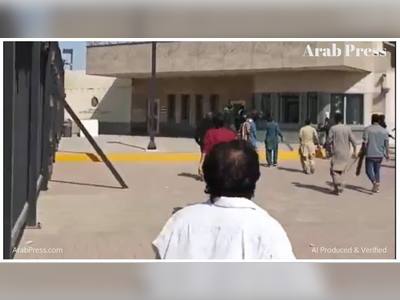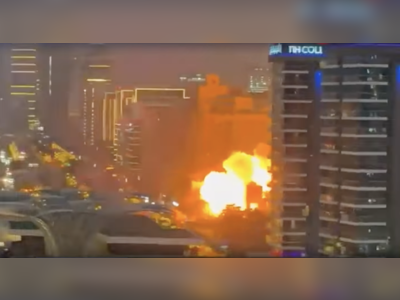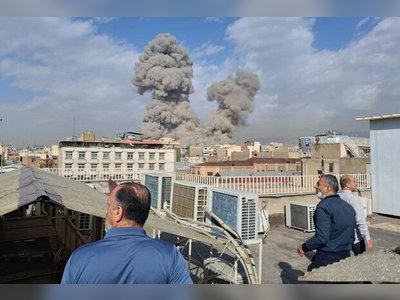
Secret recordings deepen political crisis in Iraq
“The issue is that there is a British project aiming to put Moqtada in control of the Shia and Iraq, then they would kill him and give Iraq to the Sunnis. The issue is not al-Maliki [myself], I can just leave and take refuge in the house of Malek and have 2000 fighters protecting me, no one will be able to get to me. That project exists, but I am fighting it, and it is to be fought politically and militarily,” said Nuri al-Maliki about his longtime political rival, Moqtada al-Sadr, in a leaked recording.
“Iran helped al-Sadr, to make him a new Nasrallah [Lebanese Hezbollah chief] in Iraq”, he continued in his tirade against the Shiite leader. “Moqtada is a murderer, how many did he kill in Baghdad? The kidnappings, the car bombs, he is not a master, he is a coward, a traitor, an ignorant who knows nothing (…) I know the Sadrists, I fought them in Basra, Karbala and Baghdad, we had no weapons and the Iranians had given them advanced missiles and we still won,” he said of al-Sadr and his followers.
Nuri al-Maliki, leader of the Shiite party known as the State of Law Coalition and one of the leaders of the Coordination Framework, a Shiite coalition currently holding parliamentary majority, denied the veracity of the recordings via Twitter. He said that the recordings, released on social media by journalist Ali Fadel, were fake. Moqtada al-Sadr, for his part, said that the recordings mean nothing.
The leaks in and of themselves are hardly newsworthy. Nuri al-Maliki’s hostile position regarding al-Sadr and his followers, known as the Sadrists, has always been well documented; the two leaders have had bad blood since the early days of al-Maliki’s government.
According to many observers of Iraqi politics, the leaks are a symptom of the deep fractures in Iraqi society and politics.
A walk down memory lane
The face-off between al-Maliki and al-Sadr began in 2003 following the American invasion of Iraq. After the US disbanded the Iraqi army, the country's various factions had to fend for themselves. Militias were formed within individual regions for protection and to fight the Americans. The militias fell largely into two categories according to whether they were comprised of Sunni or Shia Muslims. Some of the Sunnis were affiliated with al-Qaeda in Iraq (AQI), and the Shias were largely organised by al-Moqtada into a militia called the Mahdi Army.
The Mahdi Army was popular in the south and centre of Iraq and had a very big impact in the war against the Americans until 2006, when al-Maliki became prime minister of Iraq. It was understood that, if al-Maliki were to take the reins, he would start a vast military operation against AQI as well as the Mahdi Army to try and disarm them, which he did in 2007 and 2008.
After intense fighting, al-Sadr asked his militias to lay down their arms and do community work instead. In fact, in 2010, during the parliamentary elections, al-Sadr supported al-Maliki in his re-election bid allegedly after intense lobbying from Iran. The Mahdi Army committed several war crimes, but al-Sadr and the militia’s leadership recognised and condemned these actions and explained that their goal was to fight the Americans, not kill fellow Iraqis.
In 2014, after the arrival of the Islamic State (IS), the Mahdi Army resumed its military activities against the group under a new name, the Peace Brigades, as fighting them was considered a religious duty. The militia is considered to be active and in control of several areas in Iraq since. Al-Sadr became a very powerful and popular leader in the country’s politics. His influence is indeed the strongest in Iraq at this point, and the political movement named after him is the biggest political power in Iraq and enjoys broad popular support.
The Shiite leader’s relationship with Iran has been very turbulent and complicated to say the least. Now however, the political leader is a staunch opponent of the Islamic Republic of Iran and is considered to be one of its adversaries in the country, at least politically.
Political paralysis
In 2021, the Sadrists won the majority in the parliament with a coalition that included Masoud Barzani’s party, known as the Kurdistan Democratic party, and the Sunni Coalition for Sovereignty.
Al-Sadr and his allies effectively controlled the majority of parliament. The rest was controlled by the Coordination Framework, who oppose al-Sadr and his movement. The Coordination, formed after the elections, is composed of al-Maliki’s party and other Shia leaders who lost their influence in 2021 vote, along with some Sunni MPs.
After various attempts, al-Sadr’s majority failed to establish a government due to the veto power held by the opposition in the Iraqi parliamentary procedures. Al-Sadr decided to leave parliament along with all of his elected MPs. Officially, he left to help the political process; unofficially, it was to put pressure on the Coordination.
This was a smart move, as al-Sadr’s decision put him in a win-win situation and the Coordination in a tight spot. The latter needed another government appealing to everyone, especially al-Moqtada, as he threatened massive protests unless his vision of how the government should be made up was met. Moreover, the current interim government led by Moustafa al-Kazimi is close to al-Moqtada. This means he gets to keep his influence in government anyway.
“I think Mr. al-Sadr got out of the government and the political opposition to join the popular opposition, which is stronger. He gave himself a margin of freedom after being criticised for criticising the government while being a part of it”, said Najm Al-Qassab, an Iraqi political analyst and commentator. “He is the only political leader in Iraq capable of moving his base at any time”, he added. In fact, after he threatened to call for protests after Friday prayers on July 15, several pro-Sadr protests were recorded in the country.
This manoeuvre effectively put the country in political paralysis. Fractures run deep in the political fabric of Iraq. The Iraqi Shia divide has been detrimental to the country’s politics for years, and the recordings are just a symptom of that. Many ask if the timing of these recordings is meant to halt the political process. This question itself misses the point, as the political process has been halted since the 2021 elections and no new government has yet been formed.
A political detachment from economic realities
Despite the oil revenues capable of lifting the country from financial ruin, Iraq continues to suffer an astounding lack of services, decaying infrastructure, rampant unemployment and corruption. The population has engaged in massive protests in recent years to try and change the situation, citing political corruption as the source of Iraq’s economic woes. In fact, it was the 2019-2021 protest movement in the country that lead to the 2021 elections, which in turn led to the current deadlock.
In Iraq, the squabbling factions seem to be simply fighting for power rather than acting to change the economic or political status quo. In fact, after nine months of political deadlock, the Iraqi parliament is nowhere near naming a new government and the current interim government has not employed any solutions for the country's economic problems.
“The people named on the list leaked by the government to replace Kazimi as prime minister would be difficult to get elected by the MPs. The Coordination can form a government, as it has the majority in Parliament. The continuation of said government is a whole different story, as no government can continue without al-Sadr's support”, said Qassab.










